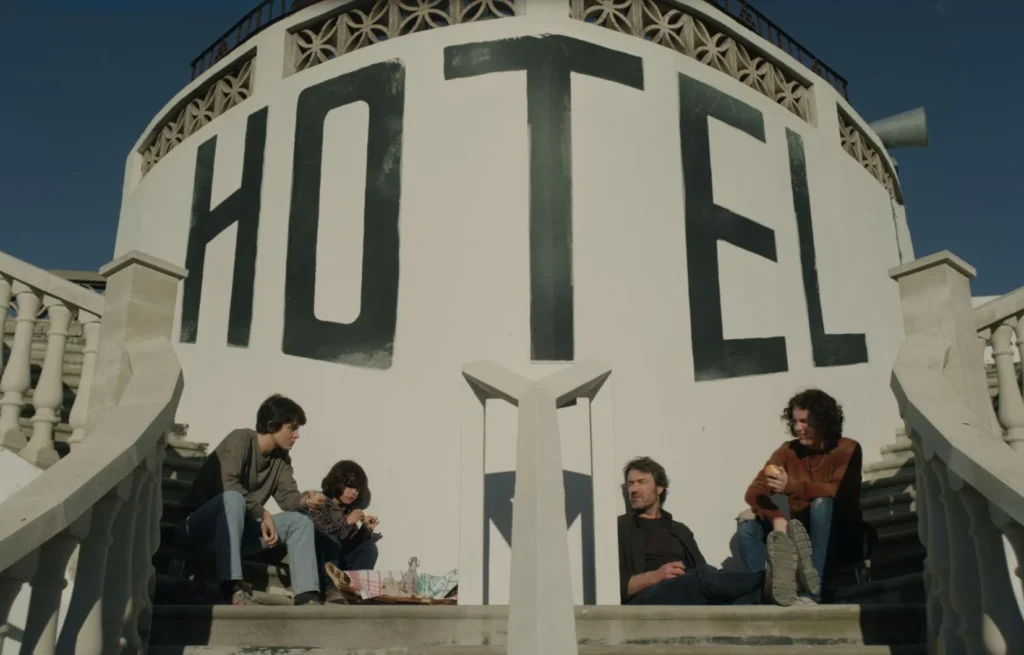by Hudson Moura
Léa Pool, one of the most esteemed directors in Quebecois cinema, returns with a powerful adaptation of the widely translated novel Ör by Icelandic author Audur Ava Ólafsdóttir. Known for her classics like Set Me Free and The Passion of Augustine, Pool delves into the existential crisis of a man whose life has lost meaning, using a war-torn landscape as the backdrop for his journey of redemption.
The story begins during the harsh Quebec winter. Jean, portrayed with precision by Sébastien Ricard, stands isolated in a vast, snow-covered field with his back to the camera, gazing out over an endless expanse of snow. The vastness reflects his emptiness as life has lost all meaning for him. His grief stems from the betrayal of his wife, but it is only hinted at until later in the film. His life has reached a breaking point—he feels abandoned and purposeless. “I’m not doing well, Mom,” he confides to his mother, who lives in a retirement home and is obsessed with war. “We all have our battles,” she responds, offering a moment of empathy. Feeling disconnected and without direction, Jean leaves a note for his 18-year-old daughter, Rose: “There comes a time when one must leave… I’m going to find myself.”
Jean embarks on a journey to an unnamed country, just emerging from the ashes of war, still in the early stages of reconstruction. He arrives in a city filled with ruins and dust, yet one relatively intact hotel becomes his refuge and place of renewal. Jean, a skilled handyman, begins fixing broken furniture and damaged structures at the hotel. His repairs go beyond the physical, symbolizing his internal healing process.

While the hotel itself, with its grand architecture resembling a monumental cruise ship, serves as the screenplay’s centrepiece, it ultimately falls short of becoming a fully developed character within the film. Its imposing presence doesn’t carry the narrative weight one might expect.
Throughout the film, Jean realizes that his personal sorrow pales compared to the suffering he witnesses in this war-torn community. “My misery is insignificant compared to those who live among ruins and dust,” he writes in his journal. “One must look into the eyes of those who suffer to share their pain.” This reflection marks a turning point for Jean, who understands that healing others is also healing for himself.
His encounter with Christina (Irène Jacob), a war journalist, reinforces this realization. She asks him bluntly, “Are you a catastrophe tourist? One of those men searching for meaning in a devastated country?” To which Jean humbly replies, “I’m just a handyman. They asked for help, and I’m trying to help. It’s good for me too… I don’t have your courage.” His role as a fixer is practical and symbolic, as he helps the community rebuild and, in turn, starts to rebuild himself.
The film’s strength lies in its portrayal of resilience amid devastation. Jean walks through the city, passing makeshift shrines and ruins, reminding us of the visible and invisible scars left by war. The distant sound of explosions serves as a stark reminder for Jean and the audience that the war may not be entirely over. Still, the quiet determination of the survivors stands in stark contrast to the destruction around them.
As Jean continues to write in his journal, he reflects on the suffering of those around him, realizing the insignificance of his own pain compared to the visible and invisible scars of war. “When you find yourself in a war zone, it’s your humanity at stake,” he writes. “One day, there will be a generation that will not remember any of this.”
Supporting characters like Ana, the hotel maid, bring added emotional depth to the narrative. Ana subtly reveals that her son Adam may have been conceived through violence, adding another layer of tragedy to the already heavy backdrop of the story. One of the film’s most sensitive moments comes when Jean helps to restore the hotel’s small cinema—a powerful symbol of their shared resilience. This scene highlights the healing power of collective experiences and the arts, offering hope amidst the destruction.
Hotel Silence is not just about physical reconstruction; it’s also a journey of emotional and spiritual healing. The film underscores that, despite life’s fragility, resilience prevails. As Jean reflects, “It only takes one encounter for everything to become possible again.” This speaks to Jean’s rediscovery of himself and the renewed sense of hope within the community for a brighter future.
Léa Pool’s direction is as poetic as ever, capturing the stillness of despair and the slow, deliberate movement toward healing. Through Jean’s journey, we witness the quiet strength of those who rebuild—their surroundings and their souls. The film will be presented at Cinéfranco—Festival International du film francophone, from November 1 to 10, 2024, at the Carlton Cinema in Toronto.